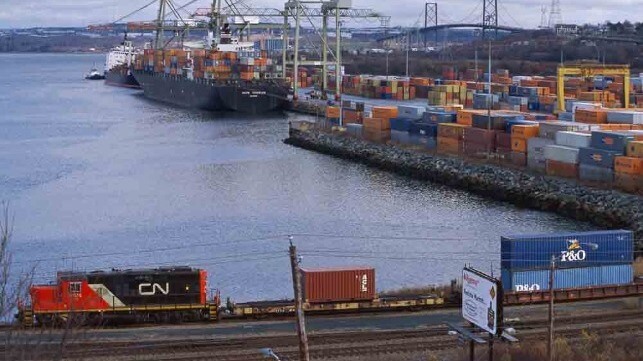Teamsters Renew Canadian Railroad Strike After Government Sets Arbitration

Hours after saying they would take down their picket lines, the Teamsters Canada Rail Conference served a new strike notice on CN, one of the two main Canadian railroads. The notice was in defiance of the federal government which on Thursday reversed its earlier stance that the labor disputes between the Teamsters union and Canada’s two national railroads should be resolved at the bargaining table.
Thursday afternoon the federal government intervened hours after the strike began saying it would impose final binding arbitration. As of Friday morning, CN was resuming operations while CPKC was waiting for government actions.
The union first said it planned to challenge the government's order for mandatory arbitration in court. The Teamsters Canada had told Reuters it was going to challenge the constitutionality of directing the dispute to Canada's labor board which would impose terms for the new contract. Late today CN confirmed it has received a new 72-hour strike notice for the union to resume the strike.
The two national railroad systems moved to lockout nearly 10,000 Teamster members as of 12:01 a.m. on Thursday after a previously ordered government cooling-off period came to an end. It was a rare event as normally Canada’s two railroads negotiate contracts in alternating years but this year each was in disputes over a range of issues. CPKC said it had been negotiating for about a year while CN said talks had started about nine months ago.
Talks had continued during the day on Thursday and were due to continue Friday. However, Labor Minister Steven MacKinnon said in a statement “The economic risk was too great to allow the lockouts to continue.” He said it was the government’s assessment that the parties were “are a fundamental impasse.” The Teamsters however are now disputing that they are at an impasse and said the negotiations should continue.
Canada, the minister said on Thursday is a trading nation and the dangers were too great for the strikes to continue. Government figures show that more than US$700 million a day in goods move in the Canadian rail system. Last year the railroads handled more than 375 million tons of freight. Major exports including grain and timber were set to be impacted as well as imports and cross-border industries such as autos. In the U.S., the White House had convened a Supply Chain Disruption Task Force.
Many shippers were scrambling to reroute their cargo, but there were fears that Canadian ports would become quickly backlogged. Key industries were reported to have at most a week before the strike would impact operations.
The federal government last week had refused to step in repeating its frequent stance that labor issues are best resolved through negotiations. Industrial leaders were pushing for the government to become more directly involved.
MacKinnon said while the dispute was between the union and railroads, the effects and impacts would be felt by all Canadians. He invoked the Canada Labour Code saying it was in the interest of “secure industrial peace and delivery.” He directed the Canadian Industrial Relations Board to become directly involved again reviewing the case and imposing final binding arbitration.
CN withdrew its lockout on Thursday evening and said operations would begin to resume on Friday. Teamsters were reporting for work, but the restart is sporadic and expected to take into the weekend to complete. CPKC was waiting for an official order from the Board before ending the lockout. The Minister said he wanted operations to resume “forthwith,” while admitting it might take a few days.

that matters most
Get the latest maritime news delivered to your inbox daily.
In addition to freight operations, more than 30,000 daily commuters were being impacted by the strike. The local lines share track with the two major railroads and were being forced to suspend operations.
